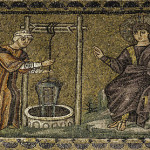We run our website the way we wished the whole internet worked: we provide high quality original content with no ads. We are funded solely by your direct support. Please consider supporting this project.

When God Endorsed Polygamy
We often find God acting as if he supports things we know, by other means, that he does not. For example, though his ideal was monogamy, it’s clear in the biblical narrative that, once God decided to permit men to acquire multiple wives and concubines, he was not above bearing the sin of his people by donning the mask of a deity who actually approves and even celebrates these things. To illustrate, in the course of Nathan chastising David for his affair with Bethsheba and for murdering her husband Uriah, the Lord is depicted as saying through the prophet Nathan:
I gave your master’s house to you, and your master’s wives into your arms. I gave you the house of Israel and Judah. And if all this had been too little, I would have given you even more (2 Sam. 12:8).
Yahweh here wears the mask of the deity who blessed David with multiple wives—indeed, with the wives that once belonged to his “master,” Saul—implying that Yahweh was the one who took them from Saul. Along the same lines, when it was time to announce David’s punishment, the Lord is depicted as saying through Nathan:
Out of your own household I am going to bring calamity on you. Before your very eyes I will take your wives and give them to one who is close to you, and he will sleep with your wives in broad daylight (2 Sam. 12:11).
Stooping to work within the culturally-conditioned and fallen framework of polygamy, and stooping, as well, to work in accordance with the system of immediate rewards and punishments that was the hallmark of God’s covenant with Israel, the Lord is portrayed as the one who was going to curse David by taking his wives and giving them to another man so that they would be raped “before [David’s] eyes” and “in broad daylight.” If we did not know better, these texts would lead us to conclude that Yahweh was a deity who not only had no problem with polygamy, he also had no problem using women as objects to “bless” favored men and to punish wayward men by having them raped in broad daylight!
While the author of this passage clearly embraced this barbaric conception of God, we who enjoy the full and complete revelation of God in Christ should suspect that something else is going on.
With our eyes fixed on Calvary, we must interpret this passage with the same depth perception of faith we have when we confess the crucified Christ to be the definitive Word of God. In this light, we may accept the portrait of God being enraged by David’s heinous sin to be direct revelation, for it is perfectly consistent with the revelation of God in Christ. But the same cannot be said of the violent and misogynistic actions that are attributed to this angry God, for it is simply impossible to imagine Christ causing women to be raped and publicly humiliated as a means of punishing their wayward husband. To this extent, therefore, this text should be understood to reflect the author’s culturally-conditioned, pen-ultimate perspective on God, which the humble God of covenantal love was nevertheless willing to step into as he “breathed” through him.
This does not mean that I deny that these women were tragically raped or that I otherwise assess this narrative to be fictional. I accept that this authoritative narrative intends to be treated as historical. It’s simply that I believe that in light of the cross, we must assess this narrative’s theological interpretation of how God was working through these events to reflect a penultimate perspective of God and to therefore function as an accommodating mask of God, depicting God as approving of activities, and engaging in activities, that he in fact finds repugnant. Yet, precisely as a mask, this narrative’s depiction of God is a shadow of the cross that points to a humble, God of cruciform love who is not above taking on an appearance that mirrors the fallen barbaric state of his people rather than that reflect his true, beautiful nature.
Image by Keoni Cabral via Flickr.
Category: General
Tags: Bible, Cruciform Theology, God
Topics: Interpreting Violent Pictures and Troubling Behaviors
Related Reading

God is Different Than You Think
The revelation of “[a] God humiliated even unto the cross,” as Pascal put it, flies in the face of what most Jews of Jesus’ time, and of what most people throughout history, have expected God to be. In this light, we can discern the thematic centrality of the cross in Jesus’ many teachings that reverse…

What do you think of Thomas Aquinas’ view of God?
Question: You have written (in Trinity and Process) that the relational God of the Bible is the antithesis of the immutable God of Thomas Aquinas. Could you explain this? Answer: Aquinas and much of the classical theological tradition borrowed heavily from Aristotle’s notion of God as an “unmoved mover.” God moves the world but remains…

Reflections on the Supremacy of Christ (Part 2)
Whereas most Christians place the revelation of God in Christ alongside of other portraits of God and end up with an amalgamated image of God, we at ReKnew encourage believers to base their understanding of God completely on Christ, and especially on Christ crucified. And we encourage disciples to work to reinterpret through the lens…

Why Doesn’t God Make Himself Obvious?
Why is faith so difficult? Why isn’t God more obvious? Why doesn’t God come out and provide irrefutable proof that he is God so that there is no more doubt? Greg’s father raised such questions and Greg’s responses are recorded in the book Letters from a Skeptic. _______________________ What would happen … if God individually…

Loving a Twilight Zone God?
David D. Flowers posted this insightful reflection over on his blog about an episode of The Twilight Zone and what it says about some pop views of God. Can we really love a God that exercises this kind of random control just because he can? We can certainly fear a God like this, but can…

What Bible Translation Do You Recommend?
Greg talks about Bible translations. http://traffic.libsyn.com/askgregboyd/Episode_0051.mp3
